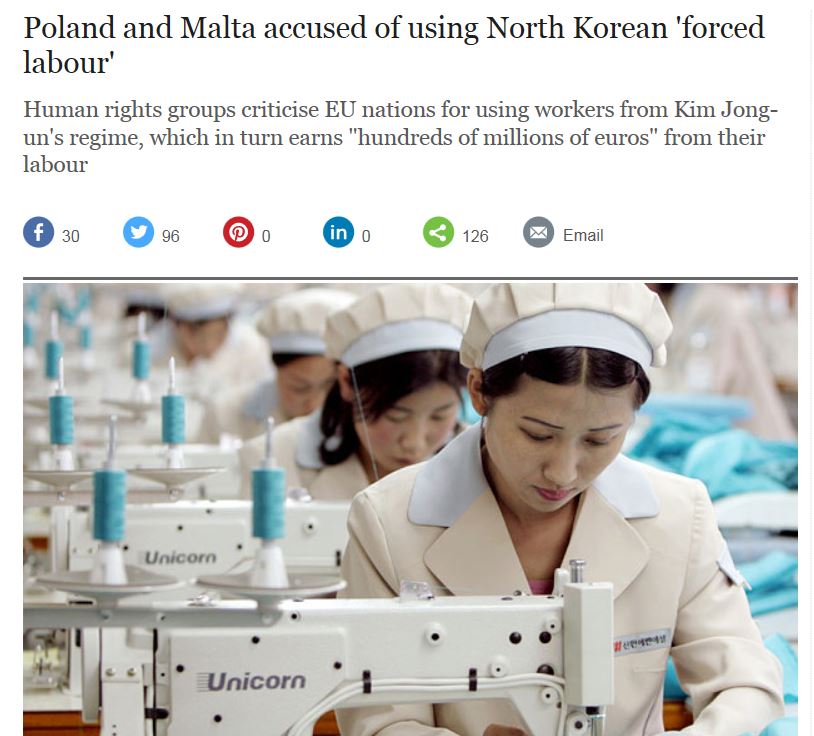Another scandal: The Telegraph reports today that Malta has issued visas to 93 North Korean slave workers since March 2013
North Korean slave labourers working at Leisure Clothing – the company is not named – are the subject of an article in the Telegraph today.
The article reports on information given by the European Alliance of Human Rights in North Korea, a British group, that two European members states – Poland and Malta – are on a global list of countries in which firms use North Koreans “provided” by Pyongyang.
These North Korean workers are literally exported by the totalitarian regime to make money for the state coffers. All the money they earn is received not by the workers but by the Pyongyang treasury. And they do not benefit from living outside North Korea, the report says, because they cannot participate.
Around 90,000 North Koreans have been exported as slaves, but most of them are working in Asian and Middle Eastern countries, including 1,800 believed to be toiling in Qatar in preparation for the 2022 World Cup.
Michael Glendinning of the European Alliance of Human Rights in North Korea told the Telegraph that Malta has issued 93 visas to North Koreans since March 2013. Given that he would have no interest in wanting to know how many were issued ‘under the Labour government’ but only in how many have been issued by Malta, full stop, this means that Malta began to issue visas to North Korean slaves immediately the Labour Party got into government.
No mention is made in the Telegraph article of the significance of that date. The Telegraph reports that most of the “forced labourers…are working for a Chinese-owned firm based in the Maltese capital, Valletta”. This would be Leisure Clothing (which is actually in Zejtun).
When I wrote about the abuse of forced labourers at Leisure Clothing, for this website some months ago, I had also reported that the Maltese embassy in Beijing has been issuing visas to North Korean workers coming in through China.
When a journalist from The Malta Independent visited the factory last January, at the invitation of Leisure Clothing fixer Adrian Grech Cumbo, one of the factory workers he interviewed on camera said clearly that she is from North Korea.
This shocking revelation passed without further remark, but it should have been investigated. My reaction when I heard it was “What? North Korea? But people are not allowed to leave North Korea; she must be one of those slaves they export.” I had just watched a Vice documentary about North Korean slaves held under supervision in a compound in a remote part of China, where they working at logging in forests. The documentary described the process by which the slaves are exported to earn foreign currency for their political masters.
But the whole thing fell into a vacuum because nobody else, except for a couple of members of the Opposition who asked a question in parliament, seemed to think there is anything untoward or questionable about North Koreans working in a factory in Malta.
Now it’s a big story in the Telegraph, which also reports that “Malta historically had a close relationship with North Korea after Kim Jong-un’s father, Kim Jong-il, studied English in the former British colony in the early 1970s.”
James Burt, who is research and policy officer at the European Alliance, told the Telegraph: “North Korean labourers are often the cheapest source of labour and are often exposed to risks without any recourse to local health and safety or justice mechanisms. Workers are rarely provided with individual contracts, passports are confiscated, and the bulk of wages are paid in foreign currencies and transferred directly to the DPRK (North Korea’s official name).”
So quite frankly, what we are looking at here is a situation in which, the very minute the Labour Party got into government, it began issuing visas for North Korean slave workers, through the Maltese embassy in China, to provide dirt-cheap labour for the Chinese-government-owned company Leisure Clothing. Leisure Clothing in turn subcontracts for Bortex, where the main shareholder and managing director is Labour ‘poster girl’ Ramona Frendo’s husband.
Meanwhile, Philip Rizzo of the Employment & Training Corporation, which is supposed to police these situations, is busy scrutinising that woman’s bosom.

